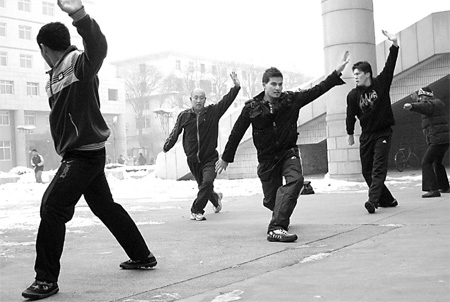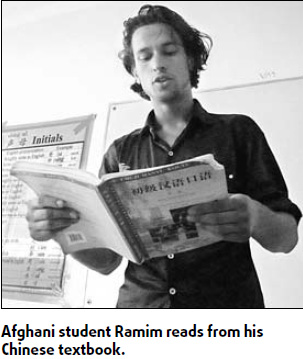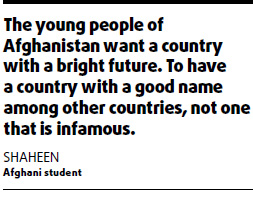Society
Afghan students get a taste of Chinese life
By Brendan Worrell (China Daily)
Updated: 2009-12-02 11:07
|
 Afghani students learn kungfu at Taiyuan University of Technology. Photos by Brendan Worrell |
At the age of 14, Aman was forced to quit school, leave home and seek asylum in neighboring Iran. "My uncle and I traveled days by bus, car and foot until we managed to find safety and employment, two things absent back home in Afghanistan."
Then with the terrorist attacks of Sept 11, 2001, and the subsequent fall of the Taliban, Aman was able to return to his homeland - although conditions were still precarious.
At one time while traveling by car back to his town from Kabul, he was stopped by bandits and robbed at gunpoint of all his possessions.
Almost a decade later, Aman's journey continues, where he finds himself at a more tranquil locale, at Taiyuan University of Technology (TUT) in Northwest China's Shanxi province, studying for a Bachelor's degree in Chinese. He is part of the first group of Afghani students in a new program set up by Afghanistan's Kabul University and China's TUT, funded by the Chinese Ministry of Education and Culture's Hanban office.
Thirteen Afghani students are being funded to study for two years in China with free tuition, board and food, plus a monthly stipend.
Expectations are high for these students who after graduation will be proficient to work at the forefront of cross-border trade and diplomatic exchanges slowly developing between China and Afghanistan.

Aman and his fellow students have already spent eight weeks in China and with little more than a year of studying Chinese in Kabul, the group is doing exceptionally well. They are able to read characters at a pre-intermediate level in a class taught entirely in Chinese.
Their teacher Shen Xiaoyan conducts the class with a glow in her eyes that conveys the pride she has developed for her students - the majority of whom tower above her in height.
It's a surprise they can even get their legs under the desks as they curl their backs and necks to read through their textbooks.
One dialogue in class is about buying a laptop computer and shopping in Beijing's famous Wangfujing mall.
Teacher Shen throws out questions in Chinese and the students respond on cue, not missing a beat though in slightly accented Afghani Chinese.
Such will be their life in Taiyuan until February 2011, with most classes beginning at 8:30 am and finishing late in the afternoon.
Most are up until midnight studying in their rooms with many already eager to get out and explore what wider China has to offer beyond the campus.
"I want to go to Shanghai," one blurts out.
"No, I want to go to Beijing and see the Great Wall," another interjects.
Professor Zhao Anyuan, vice dean of TUT's College of International Education Exchange, says they will try to organize trips for the group, although sticking to the budget is a priority.
While only two Afghani students share a room, most Chinese students at Taiyuan usually lodge with about eight other students, Zhao says.
Shen says she has taught students of many nationalities and Afghanis are no different. The smaller class size helps her to pay more attention to each student.

When asked what has been the hardest thing for them in a new country, without hesitation Aman and his classmate Shaheen respond: "The food!"
"Chinese food is so different," Shaheen explains, "the vegetables they use and the way they cook them is different from that in our country food. Also, we are Muslim."
The university cafeteria, like most Chinese universities', has a Muslim restaurant catering for their needs. Nevertheless, it will take time for the group to learn the menu and, until then, they usually just point and choose, telling the cooks what they would like to eat.
Later in the afternoon, the students don their sports attire and gather at the quadrangle outside the gym. It's -13C but no one complains.
Some lend a hand to the local Chinese students who are busy shoveling snow that is rapidly turning to ice, making walking and driving dangerous.
One couple, like young people anywhere, soon starts hurling snowballs at each other.
An older student, Ishmat, shifts from one foot to the other and murmurs: "Our country is hurt. And like the country, our people are hurt, too. Not just physically but mentally and spiritually."
Then with a wry grimace he turns away and goes back to his usual introverted self.
Finally, after the students have waited half an hour in the freezing cold, an apologetic PE teacher Professor Zhang greets them and quickly marshals them into formation. He is the provincial wushu champion and well into his middle age while still looking supple and robust.








